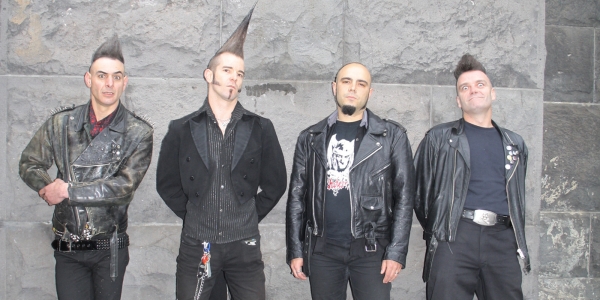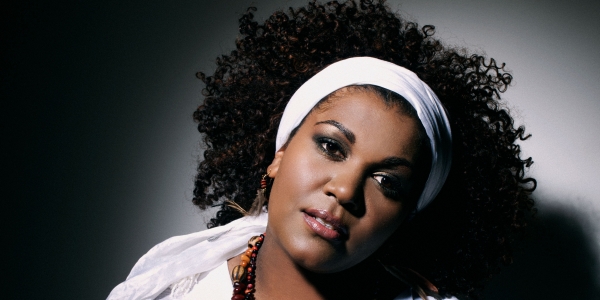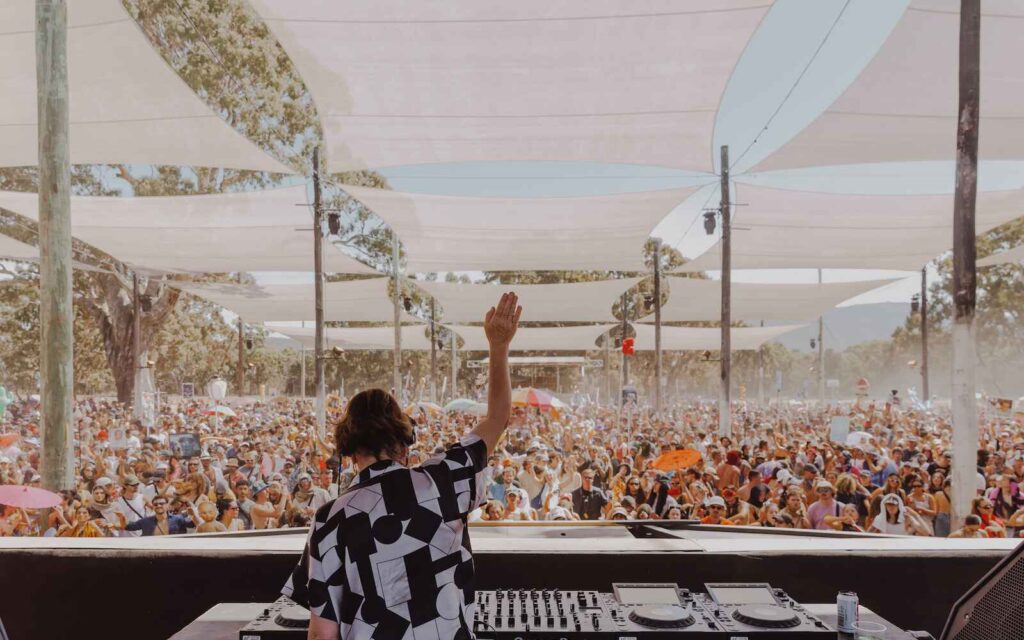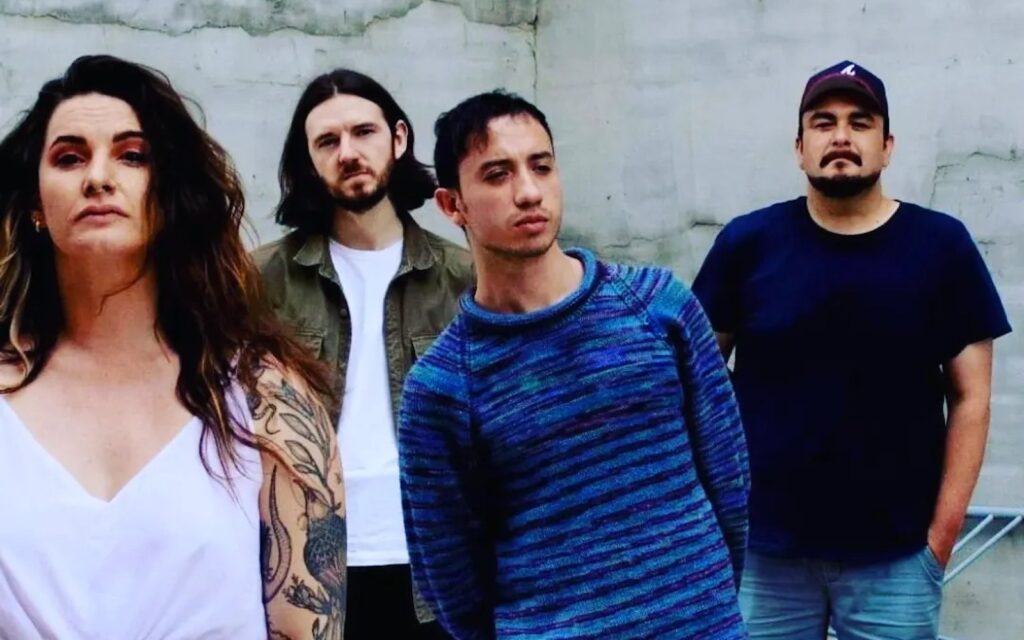The ’90s treated the band well – and after an eight-year hiatus including an alleged holiday in rehab, they reformed, and found themselves playing alongside the likes of Motley Crüe, Mötorhead and Kiss. Along the way they may’ve also taught Silverchair how to “smash up their instruments and what to do with their groupies”.
During their break however, the scene, says Fury, changed from music-driven to image-driven. “Now it looks like every psychobilly band has fallen over in a big pile of their mother’s makeup,” he laments. “But really, the music speaks for itself. It doesn’t matter if you’re wearing a dress or covered in makeup – if your songs are crap, they’re crap.”
If the Fireballs’ music were to speak, it would snarl and be coming out of your mouth at a hundred miles an hour – and their new album Hellrider displays that intensity and hell-for-leather approach emphatically. All dangerous guitars and erratic percussion, Fury ascribes it to Fireballs’ new lineup. Originally a three-piece, guitarist Matt Black was replaced with the dynamic combination of Dylan Villain and Pete Speed and consequently, they’re meaner than ever. “It’s the difference between a street car and a drag car,” he says. “What our new lineup does is basically tries to break speed barriers, demolish itself, do a wheel stand; it’ll twist, it’ll turn, it’ll come back buckled, fix itself and go out again and do it all again.”
But, pushing musical barriers is their primary focus. Back when the psychobilly genre didn’t have a name, Fireballs were carving their own niche in the grey areas between rockabilly, punk and pub rock. Now, some ten years later, they’re hoping to interest the Melbourne Symphony Orchestra in a psychobilly opus. “Now our sound is fuller, its bigger, it’s meaner, but at the same time we’re still experimenting with song writing,” says Fury. “It’s like a race,” “You’ve gotta be the first one there. There’s no trophy for second place.”
As a kid, Fury rode to school listening to his Mum’s favourite easy listening station, 3AK. It revved him up, he said, and the next thing he knew he’d taken up the drums and was making money through music. But he never had high expectations. “I don’t think you ever start a band and think you’re going to be the best thing in the world,” he muses. “Well, maybe Australian Idol is a different story… You just do what you do and it’s just really good to have other people jump on board and get excited about what you’re doing.”
And what’s Fury excited about? Simply, it can be answered with a short ‘Lemmy’. It doesn’t take him long to get the story of when the Fireballs reformed to support Mötorhead at 2005’s Blackjack Festival in Perth. “When you meet your idol, it’s really weird,” he reflects. “You sort of just look them up and down and shake their hand and say ‘I hope you have a good gig’ and you know, like I said, it’s kind of weird because you actually meet them and they’re just normal people like you and I.”
Should it be brought up that Lemmy’s far from normal? It turns it needn’t be – Fury is all too happy to continue with joking tales of debauchery. “Smoking crack and worshipping Satan… that was good,” he reminisces with a sly laugh. “Midnight orgies in the cemetery… We’re not Motley Crüe, we don’t snort ants; we’re crazier than that,” he chuckles ruefully.
The band are currently touring nationally in support of their latest album Hellrider, which means Melbourne needs to be prepared for the madness that always ensues at a Fireballs show, warns Fury. This album, in particular, is quite wild. “It’s full throttle, that’s all I can say. I don’t think you can get much faster than we’re doing,” Fury grins.
Taking time off their hectic touring schedule (they’ve been known to play upwards of 400 shows in a year), the album was self-produced, providing the band with further opportunities for experimentation. Written and recorded over a year, Fury enthuses most about the freedom of having so much time. “That’s what makes a really good record too, I think,” he contemplates.
“If you’re constantly on the road and writing on the road and playing live all the time, it’s a little bit daunting to actually stop all that and sit in a recording studio or a lounge room and try to write the ‘next big hit,'” he says. “So, it’s awesome to have the liberty of time.”
And, he says, the extra time also gave Fireballs more room to try new things. “It was really good to have the luxury of time and sort of put in what you want to hear and muck around with sound and instruments and songwriting and production and then, you know, song structure and all that sort of thing. It’s awesome,” he says. “We spent a whole year doing it. It’s self-produced through Incubator recording studios here in Melbourne with the help of Adrian Ackerman. He was a great guy to work with. He took a lot of things on board and loved the experimental side that we were sort of going on.”
But, as Fury and Fireballs have experienced before, making records, extensive touring and the rock ‘n’ roll lifestyle can take its toll. An artist can suffer burnout, Fury explains. “You’ve got to just sort of listen to silence in a lot of ways,” he says of his recovery techniques. “You’ve got to get back into it and listen to things that you probably were listening to 10 or 15 years ago and picking out the things you like about it.”
Burnout or not, Fireballs are a life that suits Fury just fine. “It’s a career in inverted commas,” he says. “Doing music isn’t work though, is it? I think it was said best: ‘when you do something you love you never work a day in your life.'”







